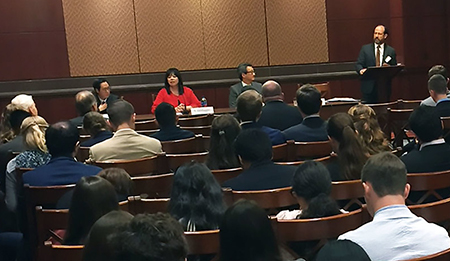“For half a century, ACA has been providing the world … with advocacy, analysis, and awareness on some of the most critical topics of international peace and security, including on how to achieve our common, shared goal of a world free of nuclear weapons.”
Events and Remarks
 Staff and experts with the Arms Control Association periodically host or participate in events to inform policymakers, journalists, and the public about important developments in arms control.
Staff and experts with the Arms Control Association periodically host or participate in events to inform policymakers, journalists, and the public about important developments in arms control.
If you have any questions about our events or wish to secure a speaker, contact us at [email protected] or at (202) 463-8270.
Below find remarks by Arms Control Association staff, board members, and experts at recent events.
The Arms Control Association 2016 Annual Meeting will take place on June 6, 2016 at the Carnegie Endowment for International Peace in Washington, D.C.
Under Article VI of the nuclear Nonproliferation Treaty (NPT), each of the parties, including the nuclear-weapon-state parties...
President Barack Obama promised in the 2010 “Nuclear Posture Review [NPR] Report” that his administration would...
The nuclear Nonproliferation Treaty (NPT) was indefinitely extended in 1995. The Comprehensive Test Ban Treaty (CTBT) was negotiated in 1996. Two decades later...
Two decades ago, on August 11, 1995, President Bill Clinton announced the United States would seek the negotiation of a true, zero-yield global nuclear test ban treaty...
The Arms Control Association hosted a Dec. 10 discussion with experts on the IAEA’s PMD report, its implications for implementation of the nuclear agreement, and the reactions in Iran to the report’s findings.
Nearly all of the world’s nations recognize that nuclear explosive testing is no longer acceptable...
Between now and Sept. 17, the U.S. Congress will face...
In the seven decades since the U.S. atomic bomb attacks on Hiroshima and Nagasaki, nuclear weapons have become ...
Negotiators from the P5+1 and Iran are in the final stretch to secure a comprehensive nuclear agreement...
The Arms Control Association 2015 Annual Meeting will examine three major challenges for nonproliferation and disarmament over the last two years of President Barack Obama's final term.
The new film, “Winds of Chemical Warfare,” traces the history and the human impact of chemical weapons, with a special focus on the 2013 sarin gas attacks...
Diplomats from the P5+1 and Iran are meeting in Lausanne, Switzerland in an effort to reach a political framework agreement for a comprehensive, long-term nuclear deal to block Iran's ...
Over the past year, Iran and the P5+1 have made significant progress on long-term solutions on several challenging issues.
First Jonathan Tucker Conference on Biological and Chemical Weapon Arms Control. Discussing Syria, OPCW, and history of chemical warfare.
The Arms Control Association and Carnegie Endowment for International Peace invite you to attend a briefing on the outcome of the negotiations and next steps, on Dec. 3 in Washington D.C.
The Embassy of Kazakhstan in Washington, D.C. and Partners Hosted a Special Event to Mark International Day Against Nuclear Tests
We are one year away from the 2015 Non-Proliferation Treaty Review Conference, and the global nuclear disarmament and risk reduction enterprise is at yet another important crossroads. The situation requires that the states gathered here must seriously consider, explore, and pursue alternative options to reduce global nuclear dangers and jumpstart progress toward the fulfillment of the ambitious 2010 NPT Action Plan.
Since the bombings of Hiroshima and Nagasaki, the catastrophic effects of nuclear weapons have driven global leaders to pursue concrete steps to reduce the threat of nuclear weapons use.
The 21-member Deep Cuts Commission, made up of former government officials and arms control experts from the United States, Russia, and Germany, have taken on the challenge of finding ways to achieve further arms control and nuclear risk reduction steps that can enhance national, Euro-Atlantic, and international security.
